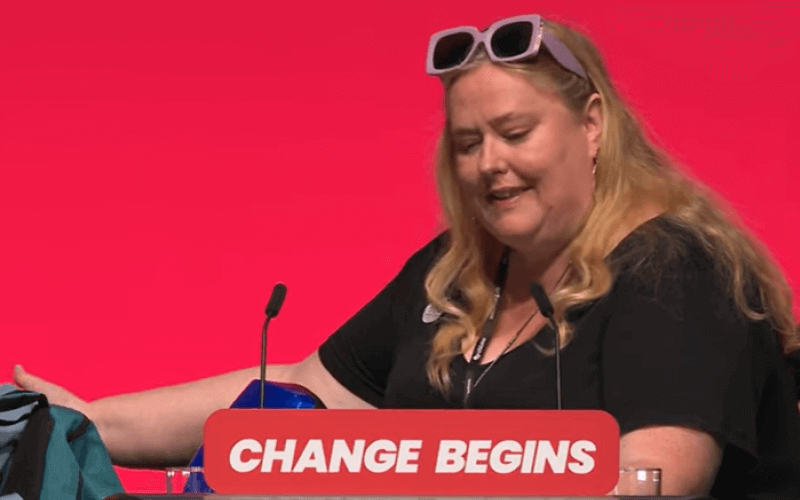Labour has been accused of treating one of its own disabled delegates like a “third-class citizen”, after refusing to allow her to enter its party conference with her assistance dog.
It is the latest example of years of disability discrimination by Labour, which has frequently left the party on the verge of being sued by its own disabled members under the Equality Act.
Disabled campaigner Anna Morell later raised her concerns from the main stage of the conference in Liverpool.
Morell, who has an energy-limiting impairment, had made her access requirements known to the party weeks before the conference began.
But when she arrived in Liverpool on the eve of the conference, she was asked in a call from a regional party officer if her dog, Rex, was trained and registered.
She replied that he was trained but that there was no such register.
She arrived at the conference with Rex the next day (Saturday), but staff prevented them entering the conference, even though she explained that he played a key health and safety role for her.
After 90 minutes lying on the floor of the security tent at the entrance, because staff could not find an accessible chair – leaving her “shaking with exhaustion and stress and cold” – she was taken to a nearby room.
She was then told that Labour’s conference policy did not allow service dogs entry without accreditation, registration, or formal training, and that only dogs registered with charities such as Guide Dogs and Canine Partners were allowed in.
Morell was offered a taxi back to her accommodation or her Kent constituency to ease her “distress”.
She was forced to return to the accommodation, where a neighbour offered to look after Rex for a few hours.
She returned to the conference that afternoon to challenge the decision, with support from Ellen Morrison, who represents Labour’s disabled members on its national executive committee (NEC).
They were told it would not be fair to reconsider the decision as other disabled people had been refused permission to bring their “unaccredited” dogs to conference.
This appears to be a clear breach of the Equality Act.
The Equality and Human Rights Commission has made it clear in guidance – updated this month – that there is no legal requirement for an assistance dog to be trained, that assistance dogs “can also be trained by their owners”, and that the law “does not require the dog to wear a harness or jacket to identify it as an assistance dog”.
Labour managers told Morell that other delegates with self-trained assistance dogs had been told they would not be allowed to attend conference “due to the impact on other attendees”.
The row meant she missed the whole of the Labour women’s conference on Saturday, at which she was supposed to be a delegate.
The next day, Sunday, she was told in an email from the secretary to Labour’s conference arrangements committee (CAC) that, after “careful consideration, and with consultation with the venue, the decision remains that you will not be able to bring your dog into the Conference site”.
The email added: “The Labour Party is committed to providing a fully accessible Annual Conference.”
Morell said the failure to accept her access needs had severely impacted her pain and energy levels, because Rex helped her manage her impairments.
It also meant she had to pay for dog-sitting for Rex.
She told Disability News Service (DNS): “They have not been able to produce the documentation that this policy is apparently based on.
“They have come up with an arbitrary rule.
“They don’t trust disabled people. That’s the vibe I get.
“I thought this was a party of equity and equality, and I can’t get through the door. I am gobsmacked and deeply exasperated.”
When she asked a question on Tuesday morning (pictured) in the main conference hall (watch from five minutes), she listed a series of access failures.
They included the party’s refusal to allow “non-registered” service dogs to enter the event, but also lifts breaking down – she had spent nearly an hour stuck in a lift with two other disabled people the previous day – failures in delivering alternative format documents, an “almost complete lack of meaningful signage around and between the venues”, and inaccessible doors and toilets.
Morell also asked why the party had not engaged with access professionals and disabled leaders within the party on how to “transform access at conference so it is accessible to all of us”.
She said disabled people “need a place at conference where our voices can be represented”.
Lynne Morris, the CAC chair, said in reply: “We work hard to ensure conference is as accessible as possible for all delegates.”
She said a CAC member was “working closely with our accessibility stewards and… Disability Labour to find a solution to any issues”, and she invited Morell to a meeting later that day to “get a full picture of what the problems are so that we can try and resolve them, if not this year, then certainly for next year”.
Ellen Morrison told DNS that disabled members were facing issues with accessibility at the Labour conference every year, with some resolved in time for the following year’s conference.
But she said she had been “disappointed” that there was a disabled member and delegate who had “faced such significant issues with being able to engage with and participate in our conference”.
Morrison said she was still “unclear” as to why Morell had been denied permission to bring Rex into the conference, and that her experience highlighted the party’s lack of a policy on assistance dogs, and the lack of training for staff and role-holders on disability and access.
She added: “I will be taking these issues up with [Labour’s] general secretary, and trust they will be addressed for future years.
“I have already raised these points with the NEC at a meeting here in Liverpool, to get the assurances this will come back as points for the whole NEC to consider.”
Kathy Bole, chair of Disability Labour, which is affiliated to the party, said she believed the party had discriminated against Anna Morell, and had treated one of their own disabled delegates “like a third-class citizen”.
She said the party appeared to believe that those disabled people with more complex access needs were not welcome at conference.
Bole said she believed the party “seemed to be going backwards” on dealing with discrimination against its disabled members.
She added: “They clearly don’t have any real idea of what the Equality Act says and their duties.”
Morell told DNS: “Until Labour gets its head around the social model of disability and applying equality law fully, accurately and meaningfully, it is going to continue to discriminate against its disabled members.”
Labour had not responded by noon today (Thursday) to a request to comment on the refusal to allow Morell’s service dog into the event.
It is the latest in years of incidents of discrimination by Labour, which has frequently seen disabled members on the brink of taking legal action against their own party.
Last year, a wheelchair-user could easily have lost his life in front of hundreds of delegates at the same venue, after the party ignored years of safety warnings about the ramp used to access the speakers’ platform.
And less than two years ago, Labour was warned that it faced possible legal action over years of disability discrimination, after reneging on plans to hold a national disability conference and set up a committee of disabled members.
A note from the editor:
Please consider making a voluntary financial contribution to support the work of DNS and allow it to continue producing independent, carefully-researched news stories that focus on the lives and rights of disabled people and their user-led organisations.
Please do not contribute if you cannot afford to do so, and please note that DNS is not a charity. It is run and owned by disabled journalist John Pring and has been from its launch in April 2009.
Thank you for anything you can do to support the work of DNS…

 Seven supermarket chains have introduced inaccessible fridges in their stores, say disabled shoppers
Seven supermarket chains have introduced inaccessible fridges in their stores, say disabled shoppers Labour and its disability minister appear to be in dispute over assistance dog discrimination at party conference
Labour and its disability minister appear to be in dispute over assistance dog discrimination at party conference